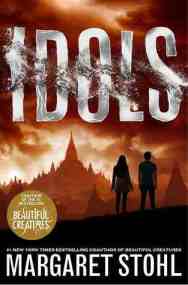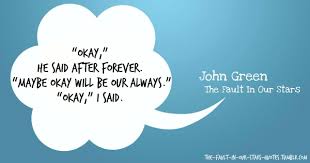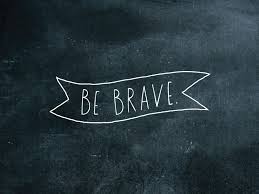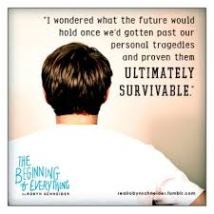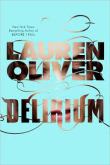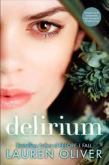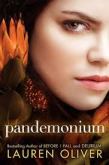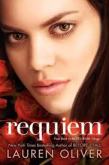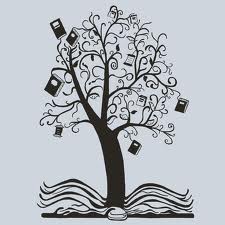Monthly Archives: January 2014
Looking forward to…
One thing that can be frustratingly challenging for me is getting excited. It’s not a feeling I am used to and probably not one I readily recognize. There’s a million and one reasons out there to explain why, but, in the end, it’s simple. I just don’t get excited. With that being said, there is something that elicits something in me that is at least akin to excitement. And that is…anticipating some upcoming book releases. Admittedly, I carry a little shame around about this because, well, I don’t have a lot of people in my life that think like I do when it comes to books. So, even the feeling that may or may not be excitement, gets squashed down and censored. It is amazing sometimes how much influence the people around us have on our emotions, even the good, positive ones. Just because my “excitement” doesn’t look like “yours” shouldn’t automatically discount mine. I know it’s books. I know it’s words. And the world may not always appreciate the value of the written word, but I do because books have saved my life, countless times. Therefore, my goal for myself is to try and honor that part of me that craves the way words are woven together time and time again to create so many different combinations of stories. It’s time for me to stop feeling shame when I hear the words, “I wish I had time to read.” I don’t read because I have time to spare. I read because it is what nurtures my soul.
So, in no particular order, here are a few books I am definitely looking forward to…
1. 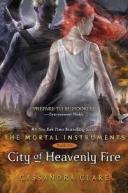 City of Heavenly Fire by Cassandra Clare
City of Heavenly Fire by Cassandra Clare
2. 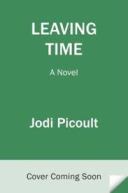 Leaving Time by Jodi Picoult (This is the one I am MOST anticipating!)
Leaving Time by Jodi Picoult (This is the one I am MOST anticipating!)
3. 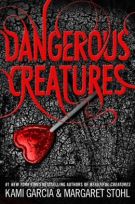 Dangerous Creatures by Kami Garcia and Margaret Stohl
Dangerous Creatures by Kami Garcia and Margaret Stohl
4. 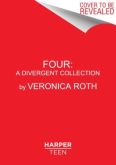 Four: A Divergent Collection by Veronica Roth
Four: A Divergent Collection by Veronica Roth
5. 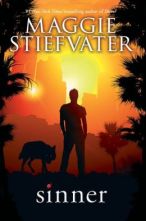 Sinner by Maggie Stiefvater
Sinner by Maggie Stiefvater
6. Burning Kingdoms: The Internment Chronicles by Lauren DeStefano
8. This Shattered World by Amie Kaufman and Meagan Spooner
The Fault in Our Stars by John Green
A lot of my students have recently discovered the works of John Green, especially The Fault in Our Stars. For that and numerous other reasons, I decided to go back and reread the book.
Hazel is living with cancer, which she calls a side effect of dying. As part of her treatment, she has to attend The Support Group in the basement of a church, with a rotating cast of others with cancer. It is here that she meets Augustus Waters, a survivor of osteosarcoma, which claimed one of his legs. Augustus is attending The Support Group in support of his friend, Isaac, who is about to have surgery that will blind him. Augustus is hot and Hazel is immediately self-conscious of her cancer-fighting body and the oxygen that she has to use and carry around with her. Hazel and Augustus begin to spend time together and bond over Hazel’s favorite book An Imperial Affliction, a novel about a girl with cancer that ends in the middle of a sentence. Hazel has sent numerous letters to the author, Peter Van Houten, inquiring about what happens to the characters, but has never received a response from him. Still, she rereads the book over and over again. Hazel has never really had feelings for a boy, having not attended school for several years and being bound by her cancer. But, Augustus is charismatic, witty, and funny and it is clear that he has feelings for her.
What I liked about this book was the honesty of the characters and their struggle with cancer, clearly realizing how separated they are from the rest of the world. But, in a way, it’s as if they are more in touch with what it means to be alive than anyone else because they know how close death could be. Plus, the interaction between Augustus and Hazel is clever and witty, drawing the reader in to wonder what will become of them both. You can’t help but love Augustus and his view on the world. And I found Hazel to be sarcastic and jaded, but rightfully so. Honestly, I was a little bored with the letters from Van Houten. I wasn’t sold on his part in the story, although I understand why his character existed. Overall, this is an achingly beautiful story with two very real characters at its center.
Where the Stars Still Shine by Trish Doller
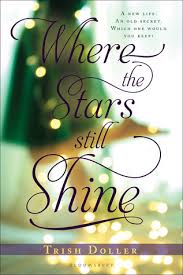 Callie has been on the run with her mom for twelve years. She doesn’t know what it’s like to have friends or new clothes or a place to really call home. On the way out of town, in the middle of the night, Callie’s mom gets pulled over by the cops and the running is over. Callie is taken back to her original home in Tarpon Springs to live with her father, her stepmother, and two little boys. And while she has the privacy of living in their old Airstream in the backyard, Callie is not used to having a stable place to live. She doesn’t know how to navigate this new family that remembers her from twelve years ago. She doesn’t know how to follow rules. She doesn’t know how to be a friend. But, Callie knows what it is like to keep a secret, despite her memories and nightmares of the sexual abuse suffered at the hands of her mother’s boyfriend. A secret she has never told anyone. But one that has had a tremendous affect on her, causing nightmares of Frank and leading her to promiscuity. It’s this way of being that leads her into bed with Alex without even knowing his name. And what keeps her going back to him, despite some warnings from her friend, Kat. As Callie and Alex’s relationship develops, Callie is torn between wanting to stay in this new life and wanting her mother back. After all, running is the one thing she has always known.
Callie has been on the run with her mom for twelve years. She doesn’t know what it’s like to have friends or new clothes or a place to really call home. On the way out of town, in the middle of the night, Callie’s mom gets pulled over by the cops and the running is over. Callie is taken back to her original home in Tarpon Springs to live with her father, her stepmother, and two little boys. And while she has the privacy of living in their old Airstream in the backyard, Callie is not used to having a stable place to live. She doesn’t know how to navigate this new family that remembers her from twelve years ago. She doesn’t know how to follow rules. She doesn’t know how to be a friend. But, Callie knows what it is like to keep a secret, despite her memories and nightmares of the sexual abuse suffered at the hands of her mother’s boyfriend. A secret she has never told anyone. But one that has had a tremendous affect on her, causing nightmares of Frank and leading her to promiscuity. It’s this way of being that leads her into bed with Alex without even knowing his name. And what keeps her going back to him, despite some warnings from her friend, Kat. As Callie and Alex’s relationship develops, Callie is torn between wanting to stay in this new life and wanting her mother back. After all, running is the one thing she has always known.
I was drawn into this story because I thought it would be fascinating to read a book about a girl in Callie’s situation, on the run for twelve years and then back to her father, who she no longer knows. And there were times when the book had me glued to it. Callie’s struggle with trying to learn how to have relationships was profound to me. Basic tools that we learn growing up, Callie missed. And yet, other areas became overly developed, like her heightened sexuality. I struggled with the frequent sexual encounters in the book, even though I understand that it was partially necessary to really understand the affect that such a heinous experience can have on someone. Trish Doller did a tremendous job of writing about such a delicate subject matter that isn’t often written about.
In the end, I wasn’t as wowed about the book as I had hoped to be. At times I was really interested in reading more and at other moments I found that I didn’t really care what happened.
Musings on the Use of Profanity and Sexual Content in YA Books
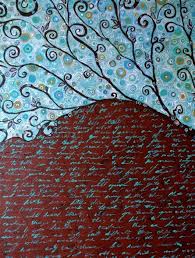 I recently discovered that the Young Adult Library Services Association (YALSA) categorizes YOUNG ADULT as ages 12-18. I work with the lower end of that range, 12 and 13 year olds. There is a huge difference from one end to the other, which brings me to these thoughts. While there is a category of books out there that fall into a MIDDLE GRADES label, I find that, sometimes, these books are written too simplistic for much of my population, especially the true readers among them. That’s not to say there is not quality fiction to be found amongst them because there certainly is a wealth of interesting plot structures and intriguing characters. But, for me, I find that the best fiction I have read is usually in the YOUNG ADULT category, which means I am constantly stocking my shelves (school and home, virtually and real) with YA books. The trouble I have, sometimes, is the heavy use of profanity and/or sexual content that is often threaded between the pages of these books. I get it. Believe me, I get it. I understand why it’s there. I understand its appeal. I get it. And yet, I still struggle with it. I want to be able to put high quality YA fiction on my shelves for students to take and absorb the immensity of complex plot structures and believable characters. I want them to be able to find themselves in those characters and in those situations. I want them to connect, to feel that deep pull that a reader has towards a book. But, admittedly, I find that I have to screen some of the books within the four walls of my classroom because of the language and content of many books. Kids know the words, probably have heard worse in the real world. They watch tv, spend time online, and are not strangers to the incredibly sex-focused world we seem to live in. Still, I want to be able to shield them at least a little bit and, honestly, I don’t think it’s my place to expose them to things that they may or may not be ready for. And, if it’s language that we don’t allow in school, I am hard pressed to allow it in what they are borrowing from my shelves. Don’t get me wrong, I don’t prevent them from reading whatever books they want. They can find YA books that I don’t have in my classroom in our library, or the city library, or the bookstore. We have conversations about the content of some books and how, sometimes, we may read things that make us uncomfortable and we can choose to put it aside. There are definitely books that need the profanity and sexual content to tell the story and tell it honestly and straightforward. Sometimes, I find a great short story to use in my classroom, but the author chose to put one or two swears in it. Will I use the story? Of course. And I merely just black out the profanity. But, honestly, if a story only has a couple of swears in it, it makes me wonder–why include it at all? Other times, the book is so thickly laden with profanity and sexual content that I can barely stand to read it as an adult (like recently, Will Grayson, Will Grayson by John Green and David Levithan). Sometimes, there are books that are somewhere in the middle. I want my students to be able to learn about the world in their reading and I know that our world is not usually filled with bright lights and rainbows. I certainly don’t want to sell them on the fake version. They deserve honesty and truth. I guess this is just me trying to continuously find the balance of doing what is right as their teacher.
I recently discovered that the Young Adult Library Services Association (YALSA) categorizes YOUNG ADULT as ages 12-18. I work with the lower end of that range, 12 and 13 year olds. There is a huge difference from one end to the other, which brings me to these thoughts. While there is a category of books out there that fall into a MIDDLE GRADES label, I find that, sometimes, these books are written too simplistic for much of my population, especially the true readers among them. That’s not to say there is not quality fiction to be found amongst them because there certainly is a wealth of interesting plot structures and intriguing characters. But, for me, I find that the best fiction I have read is usually in the YOUNG ADULT category, which means I am constantly stocking my shelves (school and home, virtually and real) with YA books. The trouble I have, sometimes, is the heavy use of profanity and/or sexual content that is often threaded between the pages of these books. I get it. Believe me, I get it. I understand why it’s there. I understand its appeal. I get it. And yet, I still struggle with it. I want to be able to put high quality YA fiction on my shelves for students to take and absorb the immensity of complex plot structures and believable characters. I want them to be able to find themselves in those characters and in those situations. I want them to connect, to feel that deep pull that a reader has towards a book. But, admittedly, I find that I have to screen some of the books within the four walls of my classroom because of the language and content of many books. Kids know the words, probably have heard worse in the real world. They watch tv, spend time online, and are not strangers to the incredibly sex-focused world we seem to live in. Still, I want to be able to shield them at least a little bit and, honestly, I don’t think it’s my place to expose them to things that they may or may not be ready for. And, if it’s language that we don’t allow in school, I am hard pressed to allow it in what they are borrowing from my shelves. Don’t get me wrong, I don’t prevent them from reading whatever books they want. They can find YA books that I don’t have in my classroom in our library, or the city library, or the bookstore. We have conversations about the content of some books and how, sometimes, we may read things that make us uncomfortable and we can choose to put it aside. There are definitely books that need the profanity and sexual content to tell the story and tell it honestly and straightforward. Sometimes, I find a great short story to use in my classroom, but the author chose to put one or two swears in it. Will I use the story? Of course. And I merely just black out the profanity. But, honestly, if a story only has a couple of swears in it, it makes me wonder–why include it at all? Other times, the book is so thickly laden with profanity and sexual content that I can barely stand to read it as an adult (like recently, Will Grayson, Will Grayson by John Green and David Levithan). Sometimes, there are books that are somewhere in the middle. I want my students to be able to learn about the world in their reading and I know that our world is not usually filled with bright lights and rainbows. I certainly don’t want to sell them on the fake version. They deserve honesty and truth. I guess this is just me trying to continuously find the balance of doing what is right as their teacher.
Where We Learn to Be Brave
The word, brave, according to the Merriam-Webster dictionary, means “feeling or showing no fear : not afraid.” But if you look up bravery, the definition is “the quality that allows someone to do things that are dangerous or frightening.” There seems to be a subtle difference between the two. Personally, I think that being brave means you are able to overcome an obstacle in the face of feeling afraid. It’s not that you lack fear; you just have that inner sense that you must do something even if your fear tells you differently.
So where do we learn how to brave?
I find myself pondering this concept of bravery a lot lately and wondering if that’s a word I would use to describe myself. I’m still not sure. Life isn’t always easy and sometimes we are forced to be brave. Do we inherently have these skills or do we develop them as a result of our environment? What makes some people braver than others? Can you teach yourself to be brave? And how do you continue to be brave when the universe continues to challenge you?
Lately, with this idea of bravery constantly sitting in the back of my mind, I notice that I read through a slightly different lens. I look for those characters that are either willingly brave or forced to be brave because I want to be braver in my everyday life. Since reading affords us the opportunity to meet characters from a range of ages and life experiences, I think there is such an opportunity to learn from them.
The one character that seems to always come back to mind is Tris from Divergent. I reread this book for the third time back in October before I read the final book in the series, Allegiant. This time, when I read, I was struck at the beginning of the book of how brave Tris really was. In her decision to leave her faction, she chose to leave behind her family and the only way of life she had ever known. She really didn’t have an understanding of what it meant to choose Dauntless, not in any real, concrete sense. Tris was afraid of her choice and what the right choice would be, but she still made it because, on some level, she recognized that she no longer belonged in Abnegation. I cannot imagine being brave enough to leave everything I know for a life that is completely uncertain and unknown, with no choice to go back.
What characters come to mind when you think of the word brave?
Forgive Me, Leonard Peacock by Matthew Quick
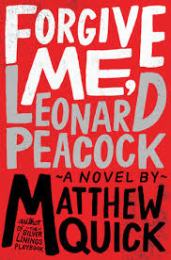 I was a little hesitant to pick up this book because I wasn’t as wowed by Silver Linings Playbook as I had hoped. And, to be entirely honest, I am still not sure how to feel about this book. On the one hand, there were parts that definitely pulled me in and kept me reading. On the other, there were times when I just wanted to be done with the book. The main character, Leonard, both infuriated me and broke my heart. Actually, I think I had a similar reaction to the main character in Silver Linings Playback.
I was a little hesitant to pick up this book because I wasn’t as wowed by Silver Linings Playbook as I had hoped. And, to be entirely honest, I am still not sure how to feel about this book. On the one hand, there were parts that definitely pulled me in and kept me reading. On the other, there were times when I just wanted to be done with the book. The main character, Leonard, both infuriated me and broke my heart. Actually, I think I had a similar reaction to the main character in Silver Linings Playback.
It is Leonard Peacock’s eighteenth birthday and he has a plan. Today is the day he is going to kill Asher Beal and kill himself. Armed with his grandfather’s gun, a P-38 WWII Nazi pistol, that was used to kill a Nazi officer, Leonard begins his day. He has goodbyes to say and gifts to give to a few people. The story that follows is one of a boy who doesn’t fit in, who has never fit in, and sees no hope for the future. He has seen the way adults look on the way to work (has spent days skipping school and following them) and the unhappiness that they still show on their way home from work. Life doesn’t get better, even though that’s what everyone seems to keep saying. Even his own mother doesn’t like him, living in New York, while Leonard stays behind in their house in New Jersey. There are a couple of bright lights in his life, including his elderly neighbor, Walt, with whom he watches old Bogart films and his Holocaust teacher, Herr Silvermann. But he needs to see this through. Asher Beal needs to be killed and Leonard needs a break from this life.
What pulled me along was the mystery surrounding Leonard’s relationship with Asher Beal, who was once his best friend. There are little hints to what happened throughout the story, but the truth doesn’t come out until Leonard is readying himself to pull the trigger. What I didn’t particularly enjoy were the constant references to the Holocaust and the Bogart quotes. I understand why Quick included them as part of Leonard’s character, but, at times, it felt forced. Also, Quick had some interesting writing techniques, such as footnotes, which were meant to help fill the reader in with a little more information. For me, it distracted from the story, since it felt like I was constantly flipping back and forth. Still, my heart broke for Leonard because he just could not find a place where he fit in the world. His feelings of loneliness were aptly conveyed and I was definitely rooting for him.
This book is definitely for older teen and adult readers.
A Poignant Read…The Beginning of Everything by Robyn Schneider…
I love a good story…who doesn’t? It is why we read or why we watch television or go to the movies. And this book, The Beginning of Everything, is a good story. A really great story, actually. But, what sets this book just a bit higher for me is the amazing way that Robyn Schneider puts her words together. She makes poignant statements about life, about grief, about growing up, about being human. But she does it through her characters in an authentic, real way. The language isn’t forced. The metaphors and applications to real, everyday life are not superficially placed. This book is one of those books that I kept thinking, “I need to write that line down,” so that I could come back to the thought or the statement. For someone who loves words and how they can be arranged to convey meaning, this book was a phenomenal read.
Ezra Faulkner tells us the story of his fall from high school grace. Popular. Good-looking. Varsity tennis player. Perfect life. And everything changes in an instant when he is hit by a car. A shattered knee ruins his tennis “career” and, from there, he no longer fits in with the same crowd. Walking with a cane, wearing a wrist brace, seeing a psychiatrist, he is just no longer the same person. And he certainly cannot keep up with the popular crowds antics. While his former friends don’t shun him outright, Ezra realizes that he is not one of them any longer. He finds himself back with his old friend, Toby, who has his own “personal tragedy” of being the kid (in fifth grade) on a roller coaster who ends up holding a severed head for the ride because someone didn’t stay seated. Then, there is Cassidy, the new girl, transferred from a boarding school, who immediately attracts Ezra’s attention. Cassidy is unlike the popular, superficial girls that Ezra used to hang out with and date. She sees the world through a different lens and helps Ezra to see how rich life is beyond keg parties and prom queens.
This book is a classic coming-of-age story, where something has to happen to force a character to grow up, in a way that he never saw coming. But the novel is not a cliche nor does it treat its characters as such. It was funny and gut-wrenching and surprising and heartbreaking. A little bit of every aspect of the lives we lead finds its way onto the pages of this book. A must read! (And reread!)
(Definitely some mature content, meant for older YA readers.)
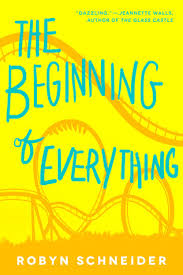
Judge a Book By Its Cover? Why, yes, I do!
 Despite the saying, “Don’t judge a book by its cover,” I do just that, literally. When it comes to people, I certainly never try to judge a person from their outward appearance, but, well, I can’t help it when it comes to book covers. The cover of the book is the first thing a reader, at least this reader, has to make a judgment about the book. A cover is that first impression; the first look into the inner workings of the plot. IT MATTERS! I want the cover to be meaningful, to draw me in, to entice me to pick it up. It can be one second and that can make all of the difference in the world.
Despite the saying, “Don’t judge a book by its cover,” I do just that, literally. When it comes to people, I certainly never try to judge a person from their outward appearance, but, well, I can’t help it when it comes to book covers. The cover of the book is the first thing a reader, at least this reader, has to make a judgment about the book. A cover is that first impression; the first look into the inner workings of the plot. IT MATTERS! I want the cover to be meaningful, to draw me in, to entice me to pick it up. It can be one second and that can make all of the difference in the world.
One of my book cover pet peeves is when “they” change a cover to a book. I have noticed that sometimes this happens when a book transitions from hardcover to paperback, though that doesn’t seem to be as prevalent. I absolutely loathe the changing of the cover because of a movie release. I get that it’s all for publicity for the movie, but I have never seen a “movie” cover that I like better. First thought, best thought. That seems to work (except when it doesn’t).
An example of a book cover change that I have admittedly been holding onto some bitterness about is for the series Delirium by Lauren Oliver. (This is one of my favorite series, regardless of the book cover mishap.) I loved the first version of the book cover for Delirium:
Luckily, I had that version before they changed it (see below), but books 2 and 3 followed the later cover version:
In the end, it didn’t really matter because I would have read books 2 and 3, regardless. But, every time I see the covers, I can’t help but wonder why they changed the theme to begin with. To me, the first one draws the reader in more because it’s more artistic and more mysterious. I also like to create my own picture in my head of what the main character looks like, based on what I read. (And this is so not how I pictured Lena!)
I don’t know a lot about how a book cover gets chosen and whether or not the author has much say in it. I know that I have read before that, often times, it is beyond any control of the author. To me, that seems ridiculous because the author is the expert on his/her book and his/her characters. Without the author, the book would not exist. It seems to me that the author would be the most important person to have involved.
If the cover is the first impression, the title is certainly right behind it. A title is just as important to me as a cover. A title has to convey enough information to lure the reader in, which can be tricky since a title cannot be very long. The combination of the book cover and the title must be enticing enough to make the reader pick the book up and read the synopsis. So much happens BEFORE the spine is even cracked open!
I wonder how many books I have passed by because of the inability of the cover and/or title to lure me in.
Reading…You Are Worthy…
It’s the onset of a New Year and people all over are making resolutions to do more of this and less of that or try this or go there. I have never been big on resolutions. I’m more of a slow and steady change kind of person. You know, the kind of change that happens so slowly you can’t always recognize it during the process? Well, that’s me. And trust me, there’s a lot I want to change. But, mostly, I just want to be me. A better version of me. But, in essence, just me. And part of being just me is honoring the reader-part of me that sometimes I am embarrassed about because it is such a HUGE part of who I am. I want to shrug off that part of me that sometimes feels shame because I am a reader and not something that the world may see as “more worthy.” Reading is a a worthy endeavor and I venture to say that it can help us all.
1. Reading teaches you about yourself. When I read Veronica Roth’s Divergent (way before the media hype), I was struck by the bravery of the main character, Tris. She leaves her family, her home, her faction. She leaves everything behind in a second because of some internal desire to pursue who she really was on the inside. How many of us can say we have done that? I want to be brave and I can learn about it from what I read. I can learn how to be almost anything, if I just let myself learn through the characters, through their trials and tribulations. You can learn things about yourself all of the time. I recently learned that I don’t need happily ever afters. And maybe I can apply that learning to some of my real life situations. As I read, I grow personally. Each time. No matter what. Every book has something it can show us.
2. Reading teaches you about relationships. I think most of me learned about boy/girl relationships when I read books by authors like Judy Blume. But, every book contains relationships. Some contentious. Some dishonorable. Some heartbreaking. Some impossible. But, even as adults, we encounter so many different people that it is impossible to know how to navigate all of our relationships. And, there are so many relationships we will NEVER experience, even if we wanted to, like being treated like a princess or being in charge of a government. Books help us to learn about all of those.
3. Reading gives us an escape. I think this is my favorite one. I am a better me when I can shut out the hustle and bustle of the world for ten minutes, an hour, a day. When I need to gather all of my senses all back inside of myself and shield myself against the sensory overloaded world, I can lose myself in a book. I can find myself far away from whatever current troubles are stalking my life. I can breathe again.
I know I am not the best me I can be if I have been away from reading for long. There is something about reading that allows me to come back to center. It helps me realign my thoughts and feelings. It helps me better see solutions for problems that need solving. I know that we live in a world that likes to eat our time, but it eats it because we let it. Rejuvenate yourself by giving yourself permission this one act of joy, however long. I don’t care if it’s the newspaper or Cosmo or Dr. Seuss or a biography. Give yourself a gift that you deserve, even if you think there is no time. We only find time for things that we believe we are worthy to spend time on. Trust me, you are worthy.
Should Have Skipped It…Cinder by Marissa Meyer
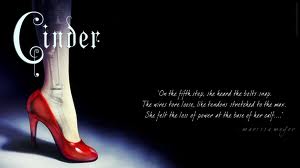 I have been looking at Cinder by Marissa Meyer since it was released about a year ago. Every time I looked at it, I decided it wasn’t for me. But something kept me coming back. Add in a recommendation from a kid or two and I decided to check it out. I’ve been on a decent streak of picking some really great books. Unfortunately, this one does not fall under my “really great” category. I was ready to abandon it about fifty pages in, which was about the same time I figured out how things would play out for Cinder and how the book was going to end. Basically, I finished it for two reasons: a) I hoped I was wrong and it was going to get much better and b) I wanted to see if I was right (because, honestly, I don’t usually “figure” out how books end). It’s safe to say, however, I will not be reading any more in this series.
I have been looking at Cinder by Marissa Meyer since it was released about a year ago. Every time I looked at it, I decided it wasn’t for me. But something kept me coming back. Add in a recommendation from a kid or two and I decided to check it out. I’ve been on a decent streak of picking some really great books. Unfortunately, this one does not fall under my “really great” category. I was ready to abandon it about fifty pages in, which was about the same time I figured out how things would play out for Cinder and how the book was going to end. Basically, I finished it for two reasons: a) I hoped I was wrong and it was going to get much better and b) I wanted to see if I was right (because, honestly, I don’t usually “figure” out how books end). It’s safe to say, however, I will not be reading any more in this series.
Here’s the basic rundown…In the Eastern Commonwealth, Cinder is a mechanic, but she is also a cyborg, made up of metallic parts, along with her human ones. Having been adopted by Garan (who died soon thereafter), Cinder is left to live with her stepmother, Adri, and two stepsisters (cue Cinderella references). She busies herself making money for Adri by fixing androids, port screens, and anything with “parts.” One day, the prince, Kai, shows up at her stall with his android, begging for her to repair it. Cinder, hiding her cyborg parts, is instantly intrigued and enamored by the prince (as is every girl). Meanwhile, a plague, letumosis, is spreading, and Cinder’s stepsister, Peony (the one she likes), gets sick and taken to isolation. Cinder, having been exposed, is taken and tested, only to find out that she is immune to letumosis, which no one is. This invokes much curiosity from the empire’s doctor. Kai is also dealing with the plague, in that his father has contracted it. Amidst his grief, Prince Kai knows that he has important political decisions to make, as letumosis claims lives within days. They are on the brink of war with the moon, Luna, unless Kai can secure a peace treaty from Queen Levana. Her terms are rigid, trying to force Kai to marry her to ensure her rule and control of the Commonwealth.
There are the obvious pushes towards the Cinderella references, which, for me, detracted from the book more than anything. I liked the main character, Cinder, well-enough and her relationship with Kai, but I didn’t really care about them. (I actually cared mostly about her own android, Iko, and the fate that it met.) In the end, it didn’t really matter who lived or died or whether or not Kai found out about Cinder being a cyborg. Like I said, it was all pretty obvious from the beginning how the story would unfold. I’m not a fan of predictable stories and I should have listened to that inner voice of mine and saved myself the money.

